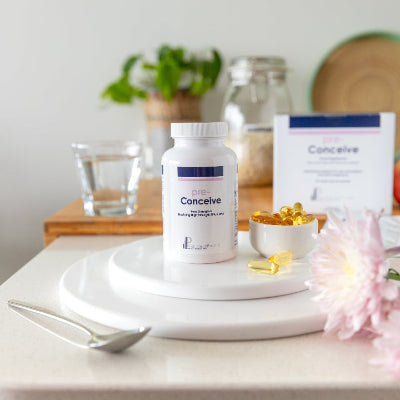If you're trying to conceive or are in the early stages of pregnancy, you've probably heard about the importance of getting enough folic acid. But what about folate; is it the same thing? And is one better than the other? Understanding the difference between folate and folic acid is essential for anyone planning a pregnancy. These nutrients play a vital role in foetal development, fertility, and even your baby’s future health. In this post, we’ll consider the differences between folate and folic acid, explain why they matter, and help you choose the best form for your body and fertility goals.
What Is Folate?
Folate is the natural form of vitamin B9, found in leafy greens, legumes, citrus fruits, liver, and eggs. It plays a crucial role in: • DNA synthesis and repair • Cell division • Red blood cell formation • Healthy neural tube development in a growing foetus
What Is Folic Acid?
Folic acid is the synthetic form of folate, used in supplements and added to fortified foods (like breakfast cereals and bread). It was introduced to help reduce the risk of neural tube defects (NTDs) in early pregnancy, a real success story of public health policy. However, folic acid must be converted by the body into the active form, 5-MTHF (5-methyltetrahydrofolate), before it can be used.
| Feature | Folate (natural) | Folic Acid (synthetic) |
|---|---|---|
| Source | Food (leafy greens, legumes) | Supplements & fortified foods |
| Bioavailability | Naturally converted to 5-MTHF | Requires conversion to 5-MTHF |
| Suitability for MTHFR gene mutation | Ideal | May not convert efficiently |
| Risk of unmetabolized folic acid | None | Possible with high doses |
Why Is Folate So Important for Fertility and Pregnancy?
- Supports Neural Tube Development One of folate’s most critical roles is preventing neural tube defects like spina bifida and anencephaly. These defects occur in the first 3 to 4 weeks of pregnancy, often before a woman knows she’s pregnant.
- Promotes Egg Quality and Ovulation Folate supports healthy cell division, which is essential for developing a healthy egg. It may also improve ovulatory function, especially in women with irregular cycles or PCOS.
- Supports Sperm Health In men, folate contributes to healthy sperm DNA, which can reduce the risk of chromosomal abnormalities.
- Aids in DNA Synthesis and Methylation Methylation is a process critical for gene expression, detoxification, and cellular health. Folate (in its active form, 5-MTHF) is essential for methylation—making it crucial for embryo development.
The MTHFR Gene Mutation:
A Key Consideration Up to 40–60% of people carry a variant of the MTHFR gene, which reduces the ability to convert folic acid into 5-MTHF. If you have this mutation (especially the C677T variant), taking traditional folic acid may not be effective and could even lead to a buildup of unmetabolised folic acid, which has been linked to adverse health effects (though this is rare).
How Much Folate Do You Need?
Before Conception:
- 400 mcg of folate (preferably as 5-MTHF) daily
- Start at least 3 months before trying to conceive
During Pregnancy:
It is generally recommended to consider continuing on 400 mcg when pregnant, though if you have any concerns or underlying conditions, your doctor may recommend more if you’ve had a previous neural tube defect or have an MTHFR mutation
Best Sources of Folate Food Sources:
- Spinach
- Kale
- Lentils
- Chickpeas
- Avocados
- Oranges
- Asparagus
- Broccoli
- Eggs
- Liver
Tip: Folate from food is less stable and can degrade with cooking, so eat some of your veggies raw or lightly steamed when possible.
Supplement Sources:
- Prenatal vitamins with methylated folate (5-MTHF)
- Avoid supplements listing only “folic acid” if you suspect an MTHFR variant
Choosing the Right Supplement
When shopping for a prenatal or fertility supplement, look for:
✅ 5-MTHF, L-methylfolate, on the label
✅ At least 400 mcg per daily dose
✅ Third-party testing or pharmaceutical-grade manufacturing
✅ No unnecessary additives or synthetic fillers
Final Thoughts:
Folate > Folic Acid for Most People Both folate and folic acid play a vital role in fertility and foetal development, but not all forms are created equal. If you're trying to conceive or already pregnant, using a supplement with methylated folate (rather than plain folic acid) ensures your body can use it efficiently, especially if you have a common MTHFR gene mutation. Taking the right form of folate is one of the simplest, most powerful things you can do to support your fertility, your pregnancy, and your baby’s long-term health.






